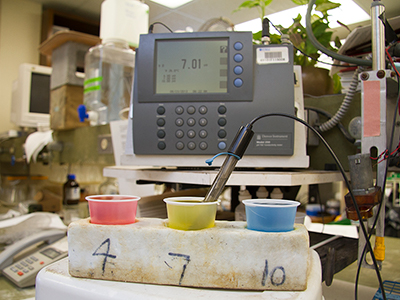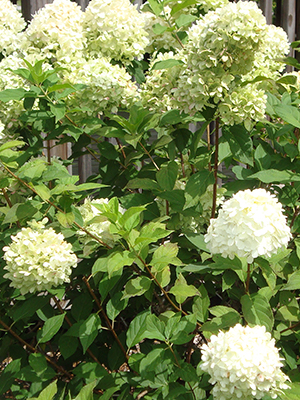Soil pH

A pH testing machine at the UF Soils Testing Lab. UF/IFAS Photo by Marisol Amador.
Soil pH is a measure of the acidity or alkalinity of the soil. Homeowners and gardeners alike are interested in soil pH because it affects the growth and quality of landscape plants. On the pH scale, a value of 7 is considered neutral, pH values less than 7 are acidic, and pH values greater than 7 are alkaline.
The median soil pH for Florida soils is 6.1, which is characterized as slightly acidic. But Florida soils can vary widely in pH. Soils in pine woods can be quite acidic. Soils that were formed from calcium-rich materials, such as limestone or sea shells, tend to be alkaline. This is particularly true of soils in coastal areas and South Florida. Building materials in the home landscape, including concrete and stucco, may create alkaline conditions as well.
Soil pH can affect the health of your landscape plants. Plants may exhibit nutrient deficiency or toxicity symptoms as a result of soil pH. In acidic soils, the availability of nutrients such as potassium (K), calcium (Ca), and magnesium (Mg) is reduced, while the amount of potentially toxic elements such as aluminum (Al), iron (Fe), and zinc (Zn) is increased. In alkaline soils, iron, manganese (Mn), zinc, and boron (B) are commonly deficient.
Determining Soil pH
Soil pH can be determined by sending a soil sample to the University of Florida Extension Soil Testing Laboratory. Some county Extension offices also test soil for pH, however the lime requirement test is only offered at the soil testing lab. Contact your county Extension office to learn what tests are offered.
For more information on how to properly take a soil sample, see the EDIS publication, "Landscape and Vegetable Garden Test Information Sheet."
Once you get the results of your soil test, you can determine which plants are best suited for your soil.
Choosing Plants for Your pH

Right plant, right place: the 'Limelight' panicled hydrangea can tolerate soil with a high pH. Photo: Beth Bolles, UF/IFAS.
All rights reserved.
Most common landscape plants tolearate a wide range of soil pH. Popular woody shrubs and trees like pittosporum, viburnum, oaks, and pines will grow well in acidic to moderately alkaline soils. Several turfgrasses can also tolerate wide ranges of soil pH.
The best pH range for vegetable and flower gardens with sandy soils is between 5.8 and 6.3. If your soil pH is between 5.5 and 7.0, no adjustment needs to be made. However, there are a few acid-loving plants, including azalea, blueberry, and gardenia, that will not do well in soils with a pH greater than 5.5.
The Florida-Friendly Plant Selection Guide (pdf) provides information about the soil pH tolerance of many Florida landscape plants. Hard copies of the list are also available from your county Extension office.
Changing Soil pH
For best plant growth and performance, always choose landscape plants suited for the natural pH of your soil. While there are additives that can raise or lower the pH of soils, the effects of these materials are often short-lived. However, if you are determined to change your soil's natural pH to grow a specific plant, you have the two following options.
Raising the pH of Acidic Soils
To raise the pH of acidic soils, add a liming material like calcium carbonate or dolomite. Dolomite has the added benefit of supplying magnesium, which is often deficient in Florida soils. Have your soil tested before applying any liming materials to the soil, because many natural and urban soils in Florida have an alkaline pH. If a soil test indicates that your soil is too acidic, have a lime requirement test performed. The lime requirement test will measure your soil's natural ability to resist changes in pH. This test is offered as part of the standard landscape and garden soil test offered through the soil testing lab. Results of this test will indicate exactly how much lime you need to apply to reach a target pH. You will then be able to apply the correct amount of agricultural limestone.
In order for lime to be effective, it should be thoroughly mixed into the soil. This is easily accomplished before planting a garden or landscape. When applying lime to established landscapes or turf, lime should be surface applied and watered in.
Lowering the pH of Alkaline Soils
Lowering the pH of strongly alkaline soils is much more difficult. In fact, there is no way to permanently lower the pH of soils formed from high-calcium materials such as marl, shell or limestone, as well as soils severely impacted by alkaline construction materials. Under these circumstances, it is best to select plants which are tolerant of high-pH
conditions to avoid continuing plant nutritional problems.
Soil pH can be temporarily lowered by adding elemental sulfur. Bacteria in the soil act to change elemental sulfur into sulfuric acid, effectively neutralizing soil alkalinity. However, the effects of elemental sulfur are localized to the area that was amended, and the effect is temporary. Soil pH will begin to rise shortly after soil bacteria exhaust the added sulfur supply. This effect will require repeated applications of sulfur to ensure the soil remains at the desired pH.
If too much sulfur is added, or if it is added too frequently, it can actually injure or kill your plants. Therefore, it is important to never apply sulfur in excess of 5 to 10 pounds of sulfur per 1,000 ft2 per application. If you decide to apply sulfur, make sure to monitor your plants.
Summary
- Before establishing or renovating a landscape, submit a soil sample to the soil testing lab.
- Consider the pH of your soil before selecting plant materials for your landscape.
- Choose Florida-Friendly plants appropriate for your site, and correct soil pH only if it's substantially higher or lower than required by the plants you are growing.
- To avoid damage to your plants, always have your soil tested before adding lime or sulfur to the soil.
- Finally, if you are determined to grow plants that aren't suited for your soil, consider growing them in containers, where the soil will be easier to amend.

